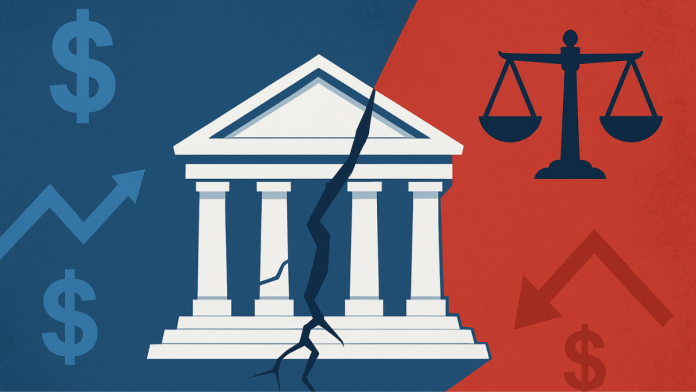Since returning to office, President Donald Trump has placed strong emphasis on exerting control over key parts of government. His focus has turned to the Federal Reserve, the nation’s central bank, which plays a critical role in managing the economy.
The Federal Reserve makes decisions on interest rates, lending rules, and overall financial stability. By law, it is designed to be independent of the White House so that it can act in the best interest of the economy rather than political agendas.
The current friction stems from the president’s public criticism of Federal Reserve Chair Jerome Powell. Powell has resisted pressure to lower interest rates quickly, arguing that the bank must act on data and not political demands. This independence has frustrated Trump, who views loyalty from appointees as a priority. Reports suggest that during his first term, he grew upset with officials who blocked him from pushing through policies that went against legal or economic norms. In this second term, he has shown less tolerance for resistance, creating tension at the highest levels of economic policy.
This conflict has raised concerns because the Federal Reserve is seen globally as a symbol of American stability. Investors, businesses, and foreign governments rely on its independence to ensure consistent and predictable policy. If the central bank is viewed as being swayed by politics, confidence in the U.S. economy could weaken.
Trump Media raises $6.42B to build massive Cronos crypto treasury
The Firing of a Board Member
Trump’s recent move to remove Federal Reserve Board Member Lisa Cook has fueled the debate further. The White House alleged possible misconduct, though no charges have been filed. Lawyers representing Cook have already announced legal action, claiming that the dismissal was unlawful. By law, members of the board can only be dismissed “for cause”, meaning clear evidence of wrongdoing must exist.
Observers say the removal seems less about Cook herself and more about testing the limits of presidential power. By reshaping the board with loyal appointees, Trump could potentially influence decisions such as interest rate changes or financial regulations. This is significant because the Federal Reserve’s seven-member board oversees policies that affect the entire banking system, consumer loans, and even the stock market.
Critics point out that the White House has framed similar moves in other areas of government as power struggles rather than policy battles. For instance, Commerce Secretary Howard Lutnick previously stated that Trump appointees must show loyalty and fidelity to the administration’s agenda. The dismissal of Cook fits a wider pattern in which loyalty and influence seem to outweigh long-standing institutional safeguards.
Why Independence Matters for the Economy
The independence of the Federal Reserve is often described as a cornerstone of the U.S. economic system. Unlike many other parts of government, the central bank operates without direct control from the president. This allows it to focus on keeping inflation in check, ensuring jobs remain stable, and supporting growth without being influenced by political campaigns or election cycles.
Trump accused of firing Fed governor over mortgages while facing his own massive loan fraud history
This setup has historically made the United States attractive to investors around the world. People trust that financial rules will not change suddenly based on political interests. Businesses see it as a safe environment to grow and hire workers. Economists note that tampering with this balance could weaken the reputation of the U.S. as a reliable place for investment.
When Trump pushes to control decisions like interest rate cuts, it raises alarms because such moves could give short-term boosts to markets but create long-term problems like inflation or financial bubbles. If businesses and global investors begin to worry that U.S. monetary policy is being dictated by politics rather than data, they may rethink their investments.
At the center of this dispute is not only the leadership of individuals like Powell or Cook but the very structure of the economic system. The Federal Reserve’s role as a non-political institution is part of what has made the U.S. financial system stable and respected for decades. Disruptions to this structure are being closely watched by economists, markets, and global leaders who understand the ripple effects such conflicts can create.


